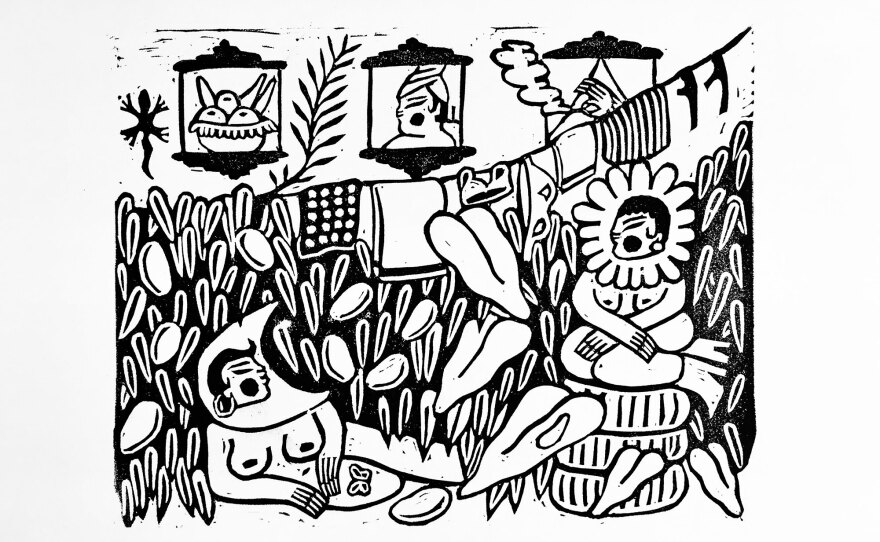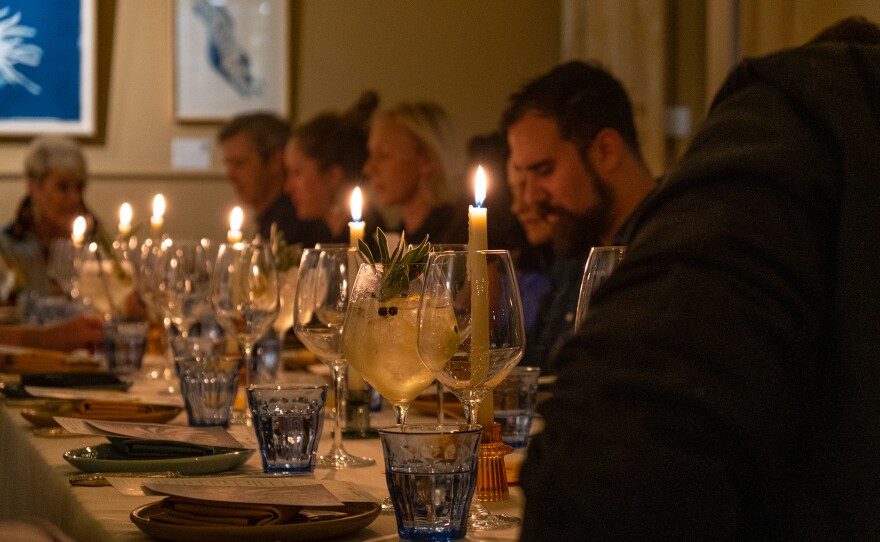Within a year after owner Chelsea Coleman opened Mabel's Gone Fishing, a gin- and seafood-themed restaurant in North Park, in 2022, it received a Bib Gourmand nod from the California Michelin Guide — one of just 10 California restaurants added that year, and the only one in San Diego. A Bib Gourmand restaurant is defined by Michelin as notable in its "good quality, good value cooking."
Coleman, who also co-founded The Rose in South Park in 2010, said that when a space adjacent to Mabel's opened up, they decided to use the expansion to design a salon-style room for additional dining and private events — and art — called the Fishbowl.
Mabel's Gone Painting launched in May 2024 with work from Mexican artist Mariana de la Fuente. Since then, five artists — mostly local — have taken a spin as resident artists in the Fishbowl. To curate the project, Coleman invited independent curator Alejandra Frank, who previously co-owned the City Heights indie art space Terros Gallery. Currently wrapping up her exhibition is Ale de Hoyos.

Mabel's Gone Fishing artists:
- Mariana de la Fuente - May 2024
- Daiga Atvara - August 2024
- Tarrah Aroonsakool - November 2024
- Oriana Poindexter - January 2025
- Ale de Hoyos - March 2025
- Up next: Christina Valenzuela
De Hoyos' exhibit features a collection of approximately 15 small works. Also a tattoo artist, she specializes in linoleum printmaking and graphite drawings. Her pieces portray women as forces of — and part of — the natural world, drawing on Mexican identity and mysticism.
"We live in a world where it's hard to make a living making something with your hands and to be supported by your neighborhood. And I think that's what artists and neighborhood restaurants are trying to do," said Coleman.
Each resident artist's exhibit culminates in a family-style artist/winemaker dinner — or in Tarrah Aroonsakool's case, a game night — exploring a theme from the work. For De Hoyos' exhibit, Coleman invited Silvana Pijoan, a winemaker from Valle de Guadalupe, to explore the artist’s themes of women in Mexican mysticism and folklore. The dinner takes place Tuesday, April 22.

Interview highlights
On food and art
Chelsea Coleman: I think art and dining and food, it's all a creative process and it's really fun and rather special when it comes together. It's the most fun thing we do, in my opinion. It's really dynamic. It's a way to bring people, create new conversations, bring new people in the door, interact with the community. It's amazing to be able to support local artists because that's what we really rely on as chefs and restaurant people, is our neighborhood. We are neighborhood restaurants, you know? So we need the community to come and support us. There's that — is it that Churchill quote? Like, what are we fighting for if not art, something along those lines? What else is there? Art is it. It's the ultimate.
We live in a world where it's hard to make a living making something with your hands and to be supported by your neighborhood. And I think that's what artists and neighborhood restaurants are trying to do.
On Ale de Hoyos' art
Alejandra Frank: I think her work is just so wonderful and playful, and it has this — it celebrates women and it also celebrates Mexican culture. You see a lot of interaction with the ground or farming — you'll see, like, cattle, you'll see corn and you'll see these women portrayed and they're nude and they're just wrapped up in nature. To me, that's what makes the work so special and wonderful. And this was a specific series that she did during the pandemic. I think it was over a course of three years where she had created the series and wanted to show it.
On food bringing people together
Coleman: I think food and art — but obviously my business and life is food — has this unique capability to bring people together and to start conversations. I really believe in the space and the conversations that happen at the table and how that can be healing for communities and families. Sharing a meal together is really special.
With the way we design the space, we try to think about that type of hospitality. And then you know with the type of food that we share with everybody — it's farm-to-table, just because I believe in less of a footprint and also I think food tastes better when it's closer, and you know who grew it. And we are organic and that is also based on a belief that that's better for you and tastes better. Ultimately, I like things that taste good. And that's actually one of our company values: "We know delicious."
We make everything from hand. We believe in passing on the skills and the history of recipes. We have some guidelines for things that can go on the menu, and they can be pretty specific depending on which restaurant, but one of them is that if it's your soul food, it can go on the menu. So it's pretty collaborative and we hope that people are cooking from their heart and that it's fun.
On building community in the artist and service industries
Frank: I've always worked in the service industry, and a lot of my friends who are artists also have worked in the service industry. So (art) kind of is this bridge that brings the front of house, the back of house and the people coming into the restaurant — it unifies it a little, and I find that to be really cool. It just seems to make sense. There's people coming in, people purchasing art and it's just speaking to a new audience as well. It feels refreshing.






